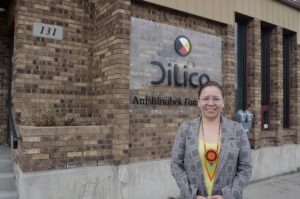First Nations health leaders remind citizens to continue exercising caution as provinces begin reopening economies

By Rick Garrick
FORT WILLIAM FIRST NATION — First Nations health leaders are reminding citizens to continue practicing social distancing and other measures to prevent the spread of coronavirus disease 2019 (COVID-19) as provinces begin reopening their economies.
“When I think about this whole pandemic and the situation we find ourselves in, social distancing is the only part that we have some type of control over,” says Natalie Paavola, director of health at Dilico Anishinabek Family Care and Namaygoosisagagun citizen. “Social distancing is absolutely necessary and our leaders [and] the government should continue to enforce this and educate on social distancing because that is the only part we have control over as an individual.”
Paavola says it is important for people to maintain their distance so they do not come into contact with COVID-19 droplets.
“If you tap someone, if you touch someone, they could potentially have a droplet on their hand and you’ve just transferred that droplet to that other individual’s hand,” Paavola says. “And if they go and touch their face afterwards, it’s passed on that way. So no touching, no high fives, no hugging, and keeping our distance, the recommended [two-metre] distance that’s put out there. It’s not hard — we just need to do it as individuals and contribute that way.”
Paavola adds that washing your hands is one of the most effective ways of decreasing the risk of spreading COVID-19.
“We just need to continue to do our part and keep ourselves and our family members safe,” Paavola says.
Karen Bannon, director of health, community and social services in Fort William, says people do not know right away if they have COVID-19 because the virus has a 14-day incubation period.
“So you could be carrying it and giving it to someone and still feel fine,” Bannon says, adding that some people may be asymptomatic and not realize they have the disease. “You don’t have to have any symptoms.”
Bannon says the social distancing measures are working to flatten the curve with COVID-19. The Thunder Bay District Health Unit (TBDHU) recommends a variety of social distancing measures, including: staying at home as much as possible; limiting non-essential trips into the community; working from home when possible and conducting virtual meetings; shopping for groceries, medicines and other supplies once a week or less; staying away from places where people are in higher numbers; avoiding visits to hospitals and care homes; and limiting contact with people at higher risk such as older adults and those in poor health.
“The real benefit behind it is it stops and reduces the spread and transmission of the virus or for any other disease for that matter,” Bannon says. “The social distancing for us is the only tool we have that’s going to help us because we lack a vaccine.”
Bannon says social distancing is difficult for Anishinabek people because many have close-knit family ties.
“It’s been difficult for us on the First Nation to social distance because it is not something common, especially with our Elders,” Bannon says. “We tend to be clannish. It’s a cultural thing for us too to have our family around us all the time, basically from grandma to grandpa to the little wee ones that run around in diapers.”
Bannon says the community has a high population of Elders as well as vulnerable people and people with addictions.
The TBDHU had 79 confirmed cases of people with COVID-19 as of May 14, including four active cases, 74 resolved cases and one deceased person.

